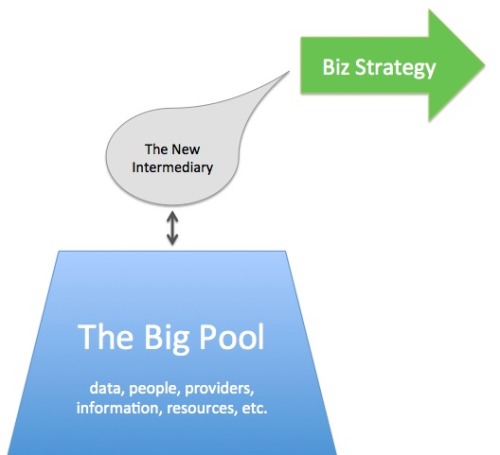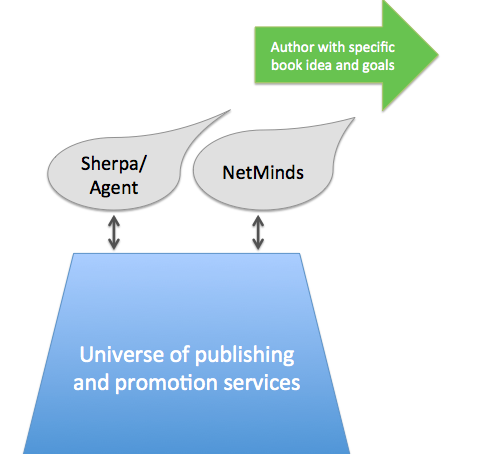The New Intermediation in Publishing
February 14, 2013 3 Comments
This week, I attended the O’Reilly Media Tools of Change for Publishing conference in NYC (well, specifically, the Author [R]evolution Day on Tuesday). It was well-attended and the buzz was palpable.
Clearly, the industry is being thoroughly disrupted by technology. Publishing is undergoing rapid disintermediation, AND rapid new intermediation. <—(click to tweet this)
Self-publishing, and assisted publishing without the help of traditional publishers, is flourishing, and we’re in the anarchy phase of it – a ferment of new ideas, platforms, and approaches, with old standards and procedures falling by the wayside while new rules are being written on the fly. It’s exhilarating and confusing.
As a relative outsider to the industry, but someone who is committed this year to pursuing long-form (book) writing, I came to the conference to see what the various options are. What I came away with was a resounding reinforcement of my message about the new intermediation.
In an introductory post on the topic I opened up the idea of the many potential business opportunities that exist by thinking about The New Intermediation. My Ugly Graphic™ below depicts how this works:
In a second post, we discussed the opportunity of Curation (filtering and delivering information) in the networked world; and then we also glanced at another manifestation of the new intermediation: Matchmaking. Those are general opportunities; now let’s turn to see how this is working in the specific sector of authoring and publishing. Instead of being forced to take the traditional route of the legacy gatekeepers (publishing houses), there is a flourishing new set of alternatives evolving:
- Assisted, rapid self-publishing: SlimBooks has an interesting approach to this.
- A la carte, author-controlled selection of services and revenue-sharing: The crew at NetMinds (including the dynamic Tim Sanders) is doing a fabulous job pioneering this approach.
- Re-defining the role of the agent into a publishing sherpa: We heard a great talk by Jason Ashlock on this subject. He even used the term “radical intermediator”!
- Iterative, progressive writing: I really like what Peter Armstrong and the Lean Pub team has come up with, and am strongly considering using this platform (I am a big fan of iterative thought development).
- Crowdfunding emerging authors: some have used the Kickstarter platform for this, but Pubslush is a focused platform for authors.
- On-line story sharing: Wattpad gets 14 million visitors every month.
- Analytics that authors can tap: Bookigee, led by Kristen McLean, is breaking new ground.
So, let’s take the drawing above and adapt it for one instance – an author looking into alternative ways to get a book to market:
(the above is not an either-or intermediary approach – could easily be both-and). I’m sure you can see other examples – for instance, intermediaries between authors and Big Data (Bookigee); between readers and authors (Wattpad), etc.
Amazon has been the classic case study of a disintermediating technology/business force, but many others are evolving. These are exciting days, with loads of new opportunities for both authors and new intermediaries. What other entrepreneurial services can you envision that would serve this community? And what tools/platforms/approaches do you recommend for others to consider?
Additional resources:
O’Reilly Media’s Best of Tools of Change collection of articles (free download)
NetMinds’ article on Choosing Between Traditional and Alternative Publishing
Guy Kawasaki’s new book, APE: Author, Publisher, Entrepreneur-How to Publish a Book (Amazon affiliate link)
—–
Recently on Connection Agent blog:








Great post Steve. Thanks. Might be the tipping point I need to finally get that dang Twitter book out. People still use Twitter, right?
It’s definitely a confusing time for authors, but exciting. Never before has so much of the publishing process been democratized. It will create some incredible successes and a lot of bad books. Hopefully, most of us will end up somewhere in between or even better!
Pingback: The New Intermediation: Specialized Domains « Connection Agent